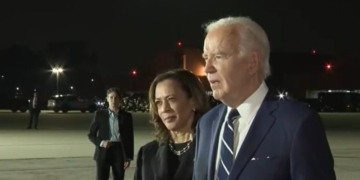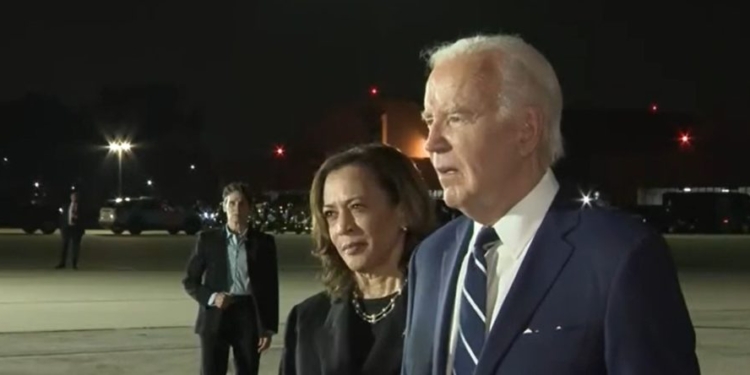On the third anniversary of the U.S. withdrawal from Afghanistan, the Biden administration has yet to fire any leadership personnel for their role in the botched operation; instead, the administration has maintained that the decision to pull out was the right move.
The U.S. withdrawal from Afghanistan in August 2021 was seen by many as a chaotic and abrupt operation that led to the deaths of several U.S. troops. But the Biden administration has largely refused to admit blame in the matter, and no leadership involved has been dismissed or resigned over the operation, according to a review of multiple records.
The Biden administration’s goal was to withdraw U.S. troops from Afghanistan by September 2021, but a failure of planning and preparation by leadership in Washington created a disordered situation for troops on the ground in Afghanistan, resulting in a disordered evacuation. There was also a miscalculation among military leaders who believed that the Taliban would not seize control of the country as quickly as the extremist group did after U.S. forces withdrew.
The Department of Defense, headed by Secretary Lloyd Austin, was intimately involved prior to and during the withdrawal, guiding U.S. military operations on the ground in Afghanistan and providing resources and intelligence for the operation. Former Joint Chiefs of Staff (JCOS) Chairman retired Gen. Mark Milley — at the time the highest ranking member of the military — was also involved in coordinating strategy and operations for the withdrawal.
Both Austin and Milley attended planning sessions for the withdrawal, retired Gen. Austin Scott Miller, the top U.S. general in Afghanistan at the time, told lawmakers during a closed-door hearing in April, according to The Washington Post. Miller had been privately warning the administration ahead of the withdrawal that Afghanistan’s stability would get “very bad, very fast” after U.S. forces departed.
Miller stepped down from his role in July 2023, after serving as the most senior U.S. officer in Afghanistan. Neither Austin nor Milley were removed from their roles over the withdrawal, though Milley testified in 2023 that he had advised the administration to keep troops in Afghanistan, arguing that the region would quickly collapse if the U.S. withdrew on the set timeline, according to The New York Times. Milley’s term as JCOS chair ended in September 2023.
For his part, Austin testified in 2023 that he supported Biden’s decision to evacuate U.S. troops in 2021 and said he didn’t “have any regrets” about the operation. Austin remains the current Secretary of Defense under Biden.
Similar to the Department of Defense, the State Department, led by Secretary Antony Blinken and tasked with overseeing U.S. foreign affairs, was also involved in planning and helping execute the Afghanistan withdrawal, especially regarding evacuating U.S. citizens present in the country. Thousands of Americans were initially stranded in Afghanistan; most of them were evacuated in the weeks and months following.
A State Department 2023 after-action report found that the withdrawal operation “was hindered by the fact that it was unclear who in the Department had the lead.” The report also noted that there was an “insufficient senior-level consideration of worst-case scenarios.”
There have been multiple credible reports that the State Department on various occasions failed to properly vet or track millions in aid to Afghanistan following the U.S. withdrawal in 2021, running the risk it could end up in the hands of the Taliban or other extremist groups.
The U.S. left over $7 billion worth of military equipment in Afghanistan. The Taliban, an Islamic extremist group ruling over Afghanistan, held a demonstration on Wednesday with American military equipment and vehicles left at a former U.S. base in the country.
Biden has not dismissed Blinken, and Blinken has not resigned from his role as Secretary of State. Nor has Jake Sullivan, Biden’s national security adviser, who would have had his ear and offered him advice prior to and during the withdrawal.
A Biden administration 2023 report assigned most blame on the former Trump administration for the withdrawal, given that Trump signed an agreement with the Taliban in 2020 to withdraw U.S. forces by 2021. After taking office in 2021, Biden tried to abide by the agreement and withdraw forces by September of that year, according to the report.
Trump and his team argue that had he been president at the time, the withdrawal would have been executed in a safe and secure manner, and blamed the Biden administration for “trying to gaslight the American people for their disastrous withdrawal from Afghanistan that directly led to American deaths and emboldened the terrorists.”
Biden has defended his choice to withdraw U.S. forces from Afghanistan when he did. He falsely claimed during a debate against Trump in June that he was “the only president this decade that doesn’t have any troops dying anywhere in the world.”
Following the withdrawal, Biden also reportedly told his top aides, including Sullivan, that he supported them and their decisions regarding the operation, according to Axios.
The Pentagon and State Department did not immediately respond to the Daily Caller News Foundation’s request for comment.
Featured Image: Screen Capture/CSPAN
All content created by the Daily Caller News Foundation, an independent and nonpartisan newswire service, is available without charge to any legitimate news publisher that can provide a large audience. All republished articles must include our logo, our reporter’s byline and their DCNF affiliation. For any questions about our guidelines or partnering with us, please contact [email protected].



























 Continue with Google
Continue with Google